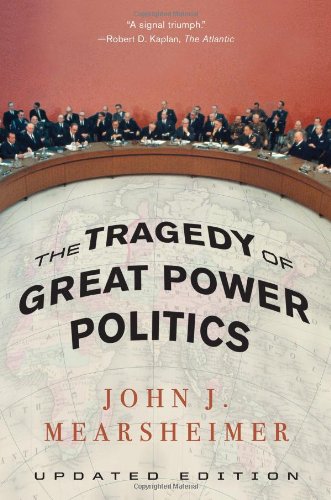The Tragedy of Great Power Politics
“A superb book….Mearsheimer has made a significant contribution to our understanding of the behavior of great powers.”—The National Interest, Barry R. Posen A decade after the cold war ended, policy makers and academics foresaw a new era of peace and prosperity, an era in which democracy and open trade would herald the “end of history.”
“A superb book….Mearsheimer has made a significant contribution to our understanding of the behavior of great powers.”—The National Interest, Barry R. Posen
A decade after the cold war ended, policy makers and academics foresaw a new era of peace and prosperity, an era in which democracy and open trade would herald the “end of history.” The terrorist attacks of September 11, 2001, sadly shattered these idyllic illusions, and John Mearsheimer’s masterful new book explains why these harmonious visions remain utopian. To Mearsheimer, great power politics are tragic because the anarchy of the international system requires states to seek dominance at one another’s expense, dooming even peaceful nations to a relentless power struggle. Mearsheimer illuminates his theory of offensive realism through a sweeping survey of modern great power struggles and reflects on the bleak prospects for peace in Europe and northeast Asia, arguing that the United States’s security competition with a rising China will intensify regardless of “engagement” policies. “This is the definitive work on offensive realism.”—ChoiceThis hardheaded book about international relations contains no comforting bromides about “peace dividends” or “the family of nations.” Instead, University of Chicago professor John J. Mearsheimer posits an almost Darwinian state of affairs: “The great powers seek to maximize their share of world power” because “having dominant power is the best means to ensure one’s own survival.” Mearsheimer comes from the realist school of statecraft–he calls his own brand of thinking “offensive realism”–and he warns repeatedly against putting too much faith in the goodwill of other countries. “The sad fact is that international politics has always been a ruthless and dangerous business,” he writes. Much of the book is an attempt to show how the diplomatic and military history of the last two centuries supports his ideas. Toward the end of The Tragedy of Great Power Politics, he applies his theories to the current scene: “I believe that the existing power structures in Europe in Northeast Asia are not sustainable through 2020.” Mearsheimer is especially critical of America’s policy of engagement with China; he thinks that trying to make China wealthy and democratic will only make it a stronger rival. This is a controversial idea, but it is ably argued and difficult to ignore. –John Miller







Comments